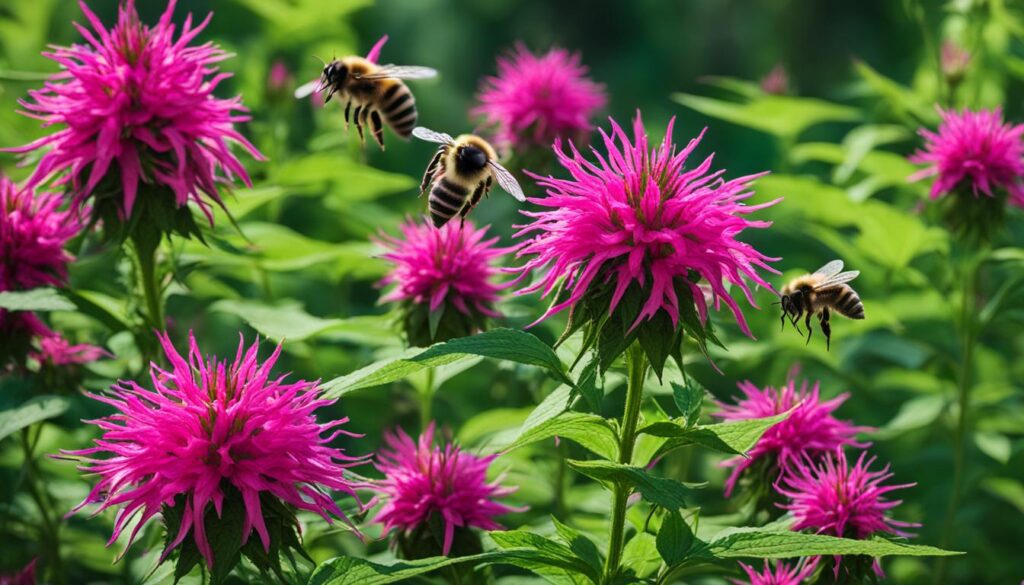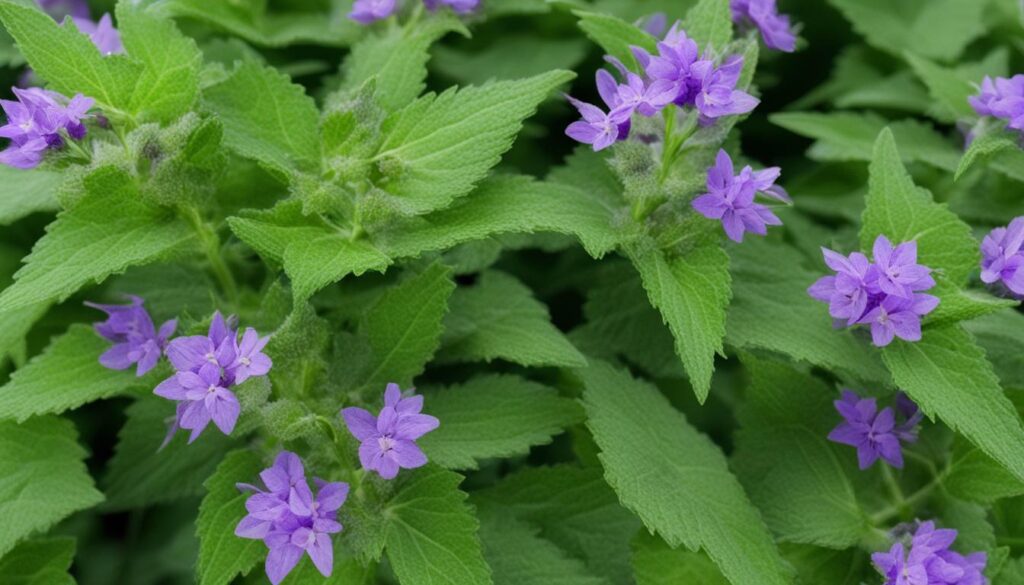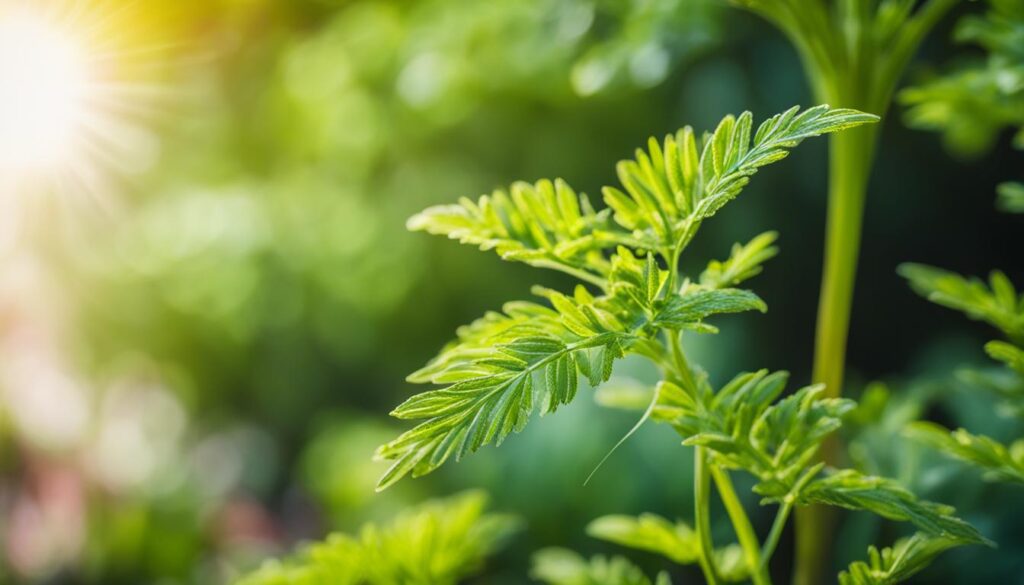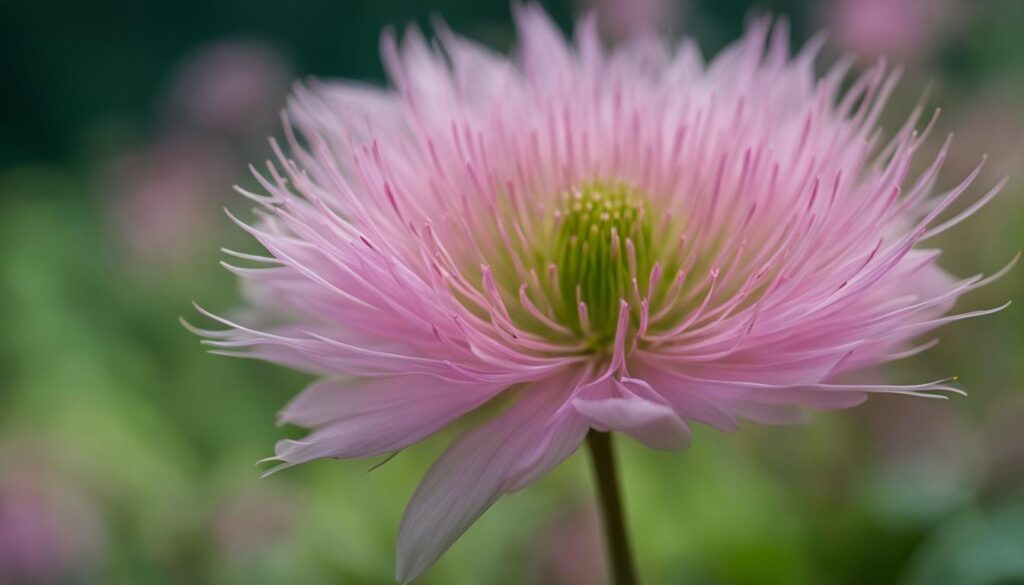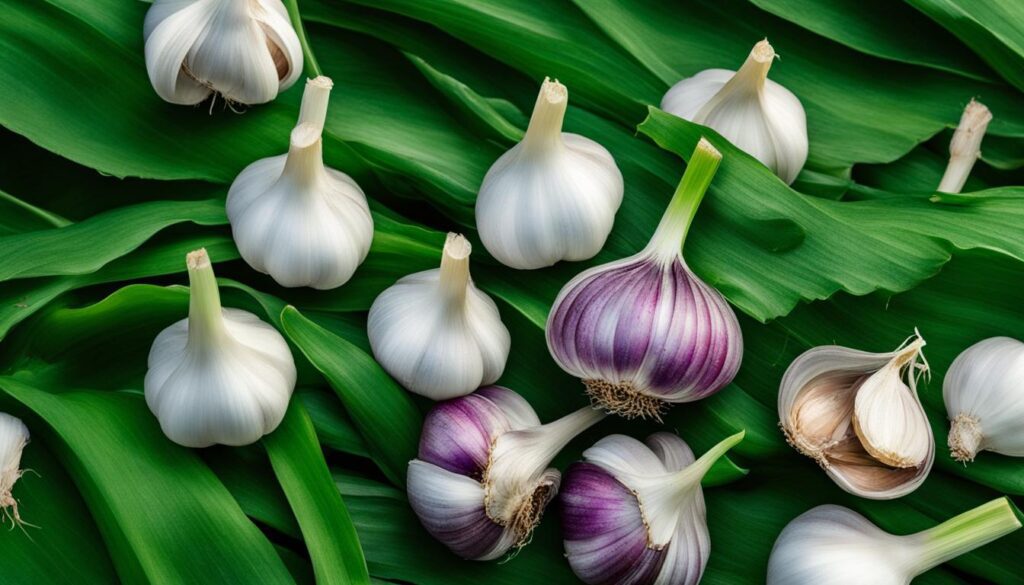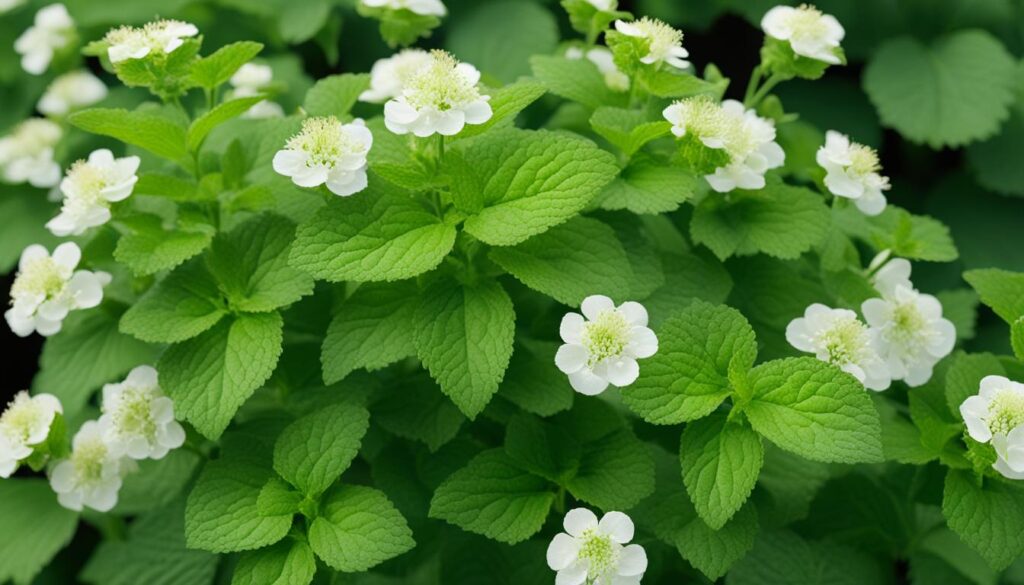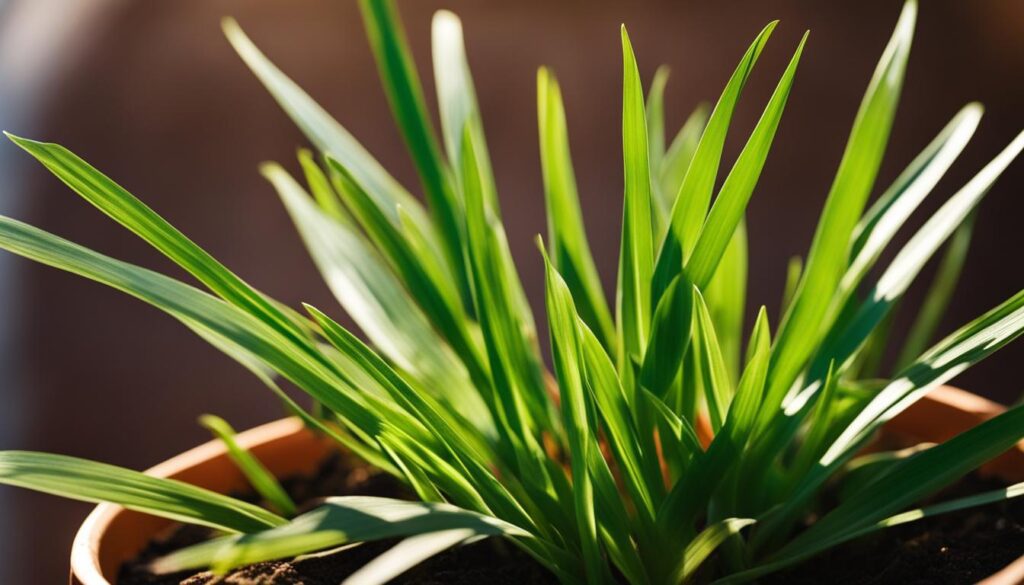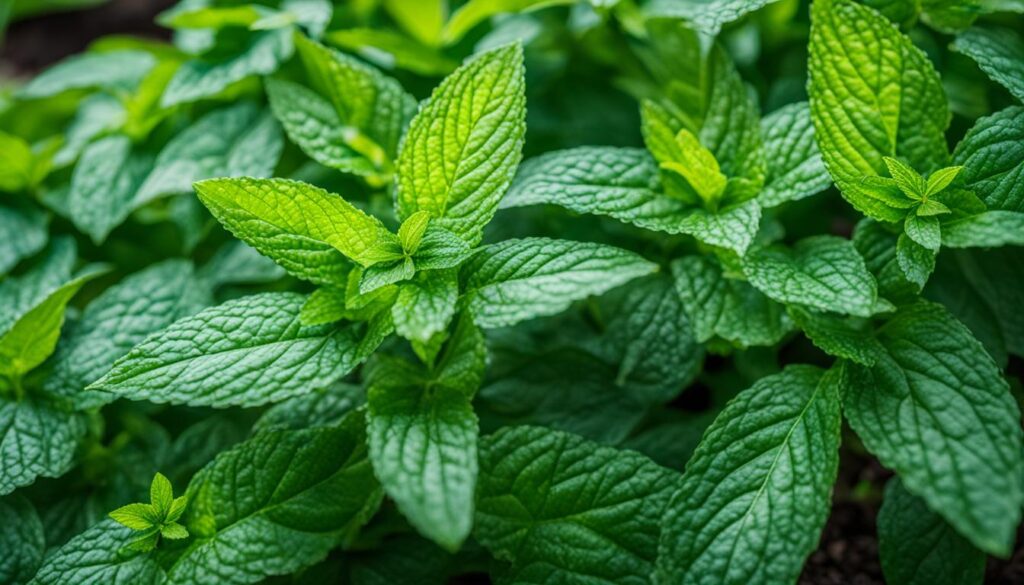Warmer weather brings pesky mosquitoes, which can be annoying and pose health risks. Instead of using harmful chemical bug sprays, consider adding mosquito repellent plants to your backyard. These plants emit scents that repel mosquitoes, creating a bug-free haven for you to enjoy. Here are 15 plants that can help keep mosquitoes away from your outdoor space.
Key Takeaways:
- By incorporating mosquito repellent plants, you can create a bug-free backyard.
- These plants emit scents that naturally repel mosquitoes.
- Strategically place these plants near seating areas, windows, and doors.
- Consider herbs like basil and catnip, as well as flowers like marigold and lavender.
- Consult with a professional before using any plants directly on your skin.
Basil
Basil is a versatile herb that not only adds flavor to dishes but also repels mosquitoes. The aroma naturally emitted by basil helps deter mosquitoes, and the plant is toxic to mosquito larvae. You can place basil near standing water to prevent mosquitoes from laying eggs. Consider adding this herb to your garden or keeping pots of basil near your seating areas to ward off mosquitoes.
Basil Benefits:
- Repels mosquitoes
- Toxic to mosquito larvae
- Can be grown in pots near seating areas
- Adds flavor to dishes
- Easy to grow and maintain
Basil is not only a flavorful herb but also a natural mosquito repellent. Its strong aroma deters mosquitoes, and it can even kill mosquito larvae. By planting basil near standing water or keeping pots near seating areas, you can create a mosquito-free zone in your backyard. Plus, you’ll have fresh basil on hand for cooking delicious meals!
When it comes to repelling mosquitoes, basil is a top choice. Its natural properties make it an effective and safe alternative to chemical bug sprays. With the added benefit of enhancing the flavor of your favorite dishes, basil is a must-have plant for a bug-free backyard.
Bee Balm: A Beautiful and Mosquito-Repelling Plant
If you’re looking for a natural way to repel mosquitoes while enhancing the beauty of your garden, bee balm is the perfect choice. Also known as wild bergamot and horsemint, this versatile plant not only keeps mosquitoes at bay but also attracts pollinators like bees, hummingbirds, and butterflies.
The Benefits of Bee Balm
Bee balm is a mosquito-repelling plant that emits a strong fragrance that deters mosquitoes. It contains natural compounds that repel these pesky insects, making it an excellent addition to any outdoor space. The blooms of bee balm not only add a pop of color to your garden but also serve as a magnet for beneficial pollinators, making it a win-win for both aesthetics and functionality. Whether you plant bee balm in your garden or use it in potted arrangements, you can enjoy its mosquito-repellent properties and the beauty of its blooms.
Tips for Growing Bee Balm
Growing bee balm is relatively easy, as it thrives in well-drained soil and prefers full sun or partial shade. It is a hardy perennial that comes back year after year, adding beauty and functionality to your garden. To get the most out of your bee balm plant, make sure to deadhead the spent blooms to encourage continuous flowering throughout the season. Additionally, pruning in early spring will help maintain the plant’s shape and prevent it from becoming too leggy. Keep in mind that bee balm can spread quickly, so it’s best to give it some space to grow and avoid overcrowding.
| Benefits of Bee Balm | Tips for Growing Bee Balm |
|---|---|
|
|
With its mosquito-repellent properties and attractive blooms, bee balm is a must-have plant for creating a bug-free and visually appealing backyard. So, go ahead and add this beautiful and functional plant to your garden to enjoy the benefits of a mosquito-free outdoor space.
Catnip: A Natural Mosquito Repellent and Feline Attractant
When it comes to natural mosquito repellents, catnip is a surprising yet effective option. Not only does catnip repel mosquitoes, but it also acts as a feline attractant. This versatile plant contains nepetalactone, a chemical compound that mosquitoes find repulsive. In fact, studies have shown that catnip is even more effective than DEET, a common ingredient in commercial insect repellents.
To use catnip as a mosquito repellent, consider planting it in your garden or keeping it in a pot. The aroma emitted by the plant naturally deters mosquitoes, creating a bug-free zone for you to enjoy. However, it’s important to note that catnip is not only attractive to mosquitoes but also to cats. If you have feline companions, consider placing catnip in a cat-friendly area to provide them with some entertainment while keeping mosquitoes at bay.
In conclusion, catnip is a natural mosquito repellent that offers a chemical-free alternative to traditional bug sprays. Its effectiveness against mosquitoes, coupled with its appeal to cats, makes it a unique and beneficial addition to any outdoor space.
Citronella Mosquito Repellents
If you’re looking for a natural insecticide to keep mosquitoes at bay in your backyard, look no further than citronella. Citronella is a well-known and effective mosquito repellent that has been used for years. Its strong scent masks the attractants that draw mosquitoes, making it an essential addition to your outdoor space.
There are several ways to incorporate citronella into your mosquito control routine. One option is to plant citronella in your garden or in planters around your seating areas. The plant requires low maintenance and will release its mosquito-repellent scent when the leaves are crushed or rubbed.
You can also use citronella candles or torches to create a mosquito-free zone. The smoke from burning citronella is a natural insecticide that repels mosquitoes and other flying pests. Place the candles or torches strategically around your outdoor space to maximize their effectiveness.
For added protection, consider using citronella oil or citronella-based sprays on your skin. These products can provide a personal barrier against mosquitoes, allowing you to enjoy your time outside without constantly swatting away bugs.
Benefits of Using Citronella
“Citronella is a natural insecticide, making it a safer alternative to chemical bug sprays.”
Using citronella as a mosquito repellent has several advantages. Firstly, it is a natural and environmentally friendly option, making it a safer alternative to chemical bug sprays. Citronella does not contain harmful chemicals that can be harmful to humans or pets.
Secondly, citronella is effective in repelling mosquitoes and creating a mosquito-free environment. Whether you choose to plant citronella or use citronella-based products, you can expect a significant reduction in mosquito activity in your backyard.
Lastly, citronella has a pleasant and refreshing scent, which adds to the enjoyment of your outdoor space. Unlike traditional insect repellents that have a strong chemical smell, citronella provides a natural and soothing fragrance. This makes it a perfect choice for those who want to create a relaxing and bug-free backyard.
Citronella Mosquito Repellent Tips
To make the most of citronella as a mosquito repellent, here are some tips to keep in mind:
- Place citronella plants or candles strategically around your outdoor space, focusing on areas where mosquitoes are likely to gather.
- Be consistent in using citronella-based products, especially during peak mosquito season.
- Consider combining citronella with other mosquito repellent plants for added effectiveness.
- Keep citronella candles and torches away from flammable materials and never leave them unattended.
By incorporating citronella into your mosquito control routine, you can create a mosquito-free outdoor environment and enjoy your time outside without the annoyance of buzzing insects.
Floss Flower: A Natural Mosquito Repellent
When it comes to keeping mosquitoes at bay, floss flower (also known as Ageratum) is an excellent choice. Not only does this beautiful plant add vibrant color to your garden, but it also contains a natural mosquito repellent called coumarin. Coumarin is a chemical commonly found in commercial insect repellents, making floss flower an effective and natural alternative.
The fuzzy flowers of the floss flower release a subtle scent that mosquitoes find repulsive. By planting floss flowers in your garden or using them as edging plants, you can keep mosquitoes away and enjoy your outdoor space without the constant annoyance of these pesky insects. Plus, the delicate blooms of the floss flowers make them a beautiful addition to any flower bed or bouquet.
To maximize the mosquito-repellent properties of floss flowers, consider planting them strategically near seating areas or windows and doors. This will help create a barrier that deters mosquitoes from entering your outdoor living spaces, allowing you to relax and enjoy the fresh air without constantly swatting away bugs.
Benefits of Floss Flower as a Mosquito Repellent
Using floss flower as a natural mosquito repellent has several advantages:
- Safe and eco-friendly: Unlike chemical-based insect repellents, floss flower is a natural option that does not harm the environment or pose risks to human health.
- Low maintenance: Floss flowers are easy to care for and require minimal attention. Simply plant them in well-drained soil, water them regularly, and watch them thrive.
- Attractive appearance: Floss flowers feature beautiful fluffy blooms in various shades of blue, pink, and white, adding a touch of charm to any garden or landscape.
By incorporating floss flower plants into your outdoor space, you can create a mosquito-free haven where you can relax, entertain, and enjoy the beauty of nature without the nuisance of buzzing mosquitoes.
Garlic: A Natural Mosquito Repellent
When it comes to keeping pesky mosquitoes at bay, garlic can be a powerful ally. Not only does it add flavor to your favorite dishes, but it also acts as a natural mosquito repellent. The pungent smell of garlic is highly effective in deterring mosquitoes, making it a great addition to your bug-fighting arsenal.
One way to utilize the mosquito-repellent properties of garlic is by consuming it. Incorporating garlic into your diet can help to repel mosquitoes from the inside out. You can also squeeze garlic juice and apply it directly to your skin to create a barrier against mosquito bites. However, it’s important to note that the strong smell of garlic may repel others as well, so use it sparingly and consider alternative methods of mosquito control.
To maximize the mosquito-repelling effects of garlic in your outdoor space, consider planting garlic bulbs or keeping potted garlic plants near seating areas, windows, and doors. Not only will this help ward off mosquitoes, but it will also add a touch of greenery to your backyard. Just be sure to provide the plants with adequate sunlight and water to ensure their growth and effectiveness as a natural mosquito repellent.
Garlic as a Bug Bite Remedy
In addition to its mosquito-repellent properties, garlic can also provide relief for bug bites. The anti-inflammatory properties of garlic can help to reduce itching, redness, and swelling caused by insect bites. Simply crush a garlic clove and apply it directly to the affected area for quick relief.
When it comes to enjoying your outdoor space without the annoyance of mosquitoes, garlic can be a valuable tool. Whether consumed or used topically, the natural properties of garlic make it an effective mosquito repellent and bug bite remedy. So, stock up on this versatile ingredient and create a bug-free haven in your backyard.
Lavender: An Effective Mosquito Repellent with a Soothing Scent
Lavender is not only known for its pleasant fragrance and calming properties but also for its effectiveness in repelling mosquitoes. The scent of lavender is highly unpleasant to mosquitoes, making it an excellent natural repellent to keep these bothersome insects at bay in your backyard.
Whether you plant lavender in your garden or use it in potted arrangements near windows, doors, and seating areas, this versatile plant can help create a mosquito-free outdoor environment for you and your family to enjoy.
Aside from its mosquito-repellent properties, lavender is also a beautiful addition to your outdoor space. Its vibrant purple blooms add color and visual appeal, while its soothing scent creates a serene atmosphere. With its dual benefits of repelling mosquitoes and enhancing the ambiance of your backyard, lavender is a must-have plant for any bug-free haven.
Benefits of Lavender as a Mosquito Repellent
| Benefits | Description |
|---|---|
| Effective Repellent | The scent of lavender is highly unpleasant to mosquitoes, effectively keeping them away from your outdoor space. |
| Soothing Scent | Lavender’s pleasant fragrance creates a calming and relaxing atmosphere in your backyard. |
| Visual Appeal | The vibrant purple blooms of lavender add beauty and color to your garden or potted arrangements. |
| Low Maintenance | Lavender is a hardy plant that requires minimal care, making it an easy addition to your backyard. |
| Attracts Beneficial Insects | Lavender also attracts pollinators like bees and butterflies, contributing to a healthy ecosystem in your garden. |
By strategically placing lavender near commonly used areas in your backyard, you can create a tranquil space free from mosquitoes and filled with the soothing scent of this versatile plant.
Please note that while lavender is generally safe for humans, it’s always a good idea to consult with a doctor or dermatologist before using any plants directly on your skin, especially if you have any allergies or sensitivities.
Lemon Balm: A Natural Mosquito Repellent for Stress Relief
When it comes to creating a bug-free backyard, lemon balm is a powerful weapon against pesky mosquitoes. Not only does it keep these blood-sucking insects at bay, but it also offers stress relief with its soothing properties. Lemon balm, also known as Melissa officinalis, is a fragrant herb that emits a lemony scent, making it an excellent choice for mosquito-repellent purposes.
Lemon balm contains citronellal, a compound known for its mosquito-repellent properties. The scent of lemon balm masks the attractants that mosquitoes are drawn to, effectively deterring them from your outdoor space. The calming aroma of lemon balm also provides stress relief, helping you relax and enjoy your bug-free haven.
To utilize lemon balm as a natural mosquito repellent, you can plant it in a container and place it strategically near seating areas, windows, and doors. This will create a barrier that mosquitoes are less likely to cross, allowing you to enjoy your outdoor activities without constant buzzing and itchy bites. Remember to crush the leaves occasionally to release more of the scent and enhance its effectiveness.
Benefits of Lemon Balm as a Mosquito Repellent:
- Effectively repels mosquitoes with its citronellal content
- Provides stress relief with its calming and soothing properties
- Creates a barrier around seating areas, windows, and doors
- Enhances the overall outdoor experience by preventing mosquito bites and annoyance
With lemon balm, you can achieve a bug-free backyard while enjoying the benefits of stress relief. Incorporate this natural mosquito repellent into your outdoor space and transform it into a tranquil haven.
Lemongrass: A Natural Mosquito Repellent with a Flavorful Twist
If you’re looking for a natural way to repel mosquitoes and add a unique flavor to your dishes, lemongrass is the perfect plant for you. With its high concentration of citral, an oil commonly used in mosquito repellents, lemongrass effectively keeps those pesky insects at bay. But its benefits don’t end there – lemongrass also brings a touch of Southeast Asian cooking to your backyard.
Native to tropical regions, lemongrass is known for its fresh, citrusy aroma that mosquitoes find repulsive. By planting lemongrass in your garden or keeping it in a container on your patio, you can create a mosquito-free outdoor space while enjoying its pleasant fragrance. And the best part? You can harvest the stalks and incorporate them into your favorite Asian-inspired recipes.
Whether you’re making lemongrass-infused soups, stir-fries, or teas, this versatile herb adds a delightful citrusy flavor and aroma to your culinary creations. Lemongrass complements a wide range of dishes, including curries, seafood, and even desserts. Its unique taste adds a refreshing twist to your meals, transporting you to the vibrant flavors of Southeast Asian cuisine.
| Lemongrass Benefits | Uses | Additional Information |
|---|---|---|
| Repels mosquitoes naturally | – Plant in your garden to create a mosquito-free zone – Keep in a container on your patio or deck – Harvest lemongrass stalks for use in recipes |
– Citral in lemongrass is a natural mosquito repellent – Enhances the flavor of Asian-inspired dishes – Easy to grow and maintain |
So, if you’re tired of swatting away mosquitoes and want to add an exciting flavor to your meals, consider incorporating lemongrass into your outdoor space. Not only will you enjoy a bug-free backyard, but you’ll also have the opportunity to explore the culinary wonders of Southeast Asia. Embrace the benefits of lemongrass and create an oasis that keeps both mosquitoes and taste buds satisfied.
Marigold: Nature’s Insect-Repelling Flowers
When it comes to creating a bug-free backyard, marigolds are a gardener’s best friend. These vibrant flowers not only add a burst of color to your outdoor space but also act as natural insecticides, repelling unwanted pests such as mosquitoes and aphids. Marigolds contain a compound called pyrethrum, which is commonly used in many natural insect repellents.
Planting marigolds in your garden or as edging plants around your vegetable beds can help protect your plants from infestations. The strong fragrance emitted by marigolds masks the scents that attract insects, making your garden less appealing to pests. Additionally, marigolds attract beneficial insects like ladybugs and lacewings, which feed on harmful garden pests.
These low-maintenance flowers thrive in full sun and well-drained soil, making them perfect for gardens and containers alike. Marigolds are available in various colors and sizes, so you can choose the varieties that best suit your aesthetic preferences. With their insect-repelling properties and beautiful blooms, marigolds are a must-have addition to any bug-free backyard.
Peppermint: A Natural Mosquito Repellent and Bug Bite Remedy
When it comes to keeping mosquitoes at bay and soothing bug bites, peppermint is a versatile herb that does the job effectively. With its refreshing aroma and natural properties, peppermint offers a holistic solution for creating a bug-free backyard. Let’s explore the benefits of peppermint as a mosquito repellent and a reliever of bug bites.
Mosquito Repellent Properties
Peppermint contains compounds such as menthol and limonene that have been found to repel mosquitoes. The strong scent of peppermint masks the attractants that mosquitoes are drawn to, making it an effective natural repellent. By strategically planting peppermint in your garden or placing potted peppermint near seating areas, windows, and doors, you can create a barrier that keeps mosquitoes away.
Relieving Bug Bites
Peppermint’s cooling and soothing properties make it an excellent remedy for bug bites. When applied topically, peppermint oil can provide relief from itching and inflammation caused by mosquito bites. Simply dilute a few drops of peppermint essential oil in a carrier oil and apply it to the affected area for quick relief. Alternatively, you can make a peppermint-infused balm or lotion to keep on hand for soothing bug bites.
A Word of Caution
While peppermint is generally safe to use, it’s important to note that some people may have sensitivities or allergies to peppermint oil. Before using peppermint oil topically, perform a patch test on a small area of skin to check for any adverse reactions. Additionally, if you have pets, keep peppermint plants or products out of their reach, as peppermint can be toxic to certain animals.
Incorporating peppermint into your outdoor space not only helps repel mosquitoes but also provides relief from those pesky bug bites. With its natural properties and pleasant scent, peppermint is a wonderful addition to any backyard or garden. So, why not harness the power of peppermint to enjoy a bug-free outdoor haven this summer?
Can Mosquito Repellent Plants also Repel Spider Mites on Cucumber Plants?
Yes, some mosquito repellent plants like citronella, lavender, and basil can also help in repelling spider mites on cucumber plants. Planting these natural insect-repelling plants around your cucumber garden can help you learn how to beat spider mites without using chemical pesticides.
Conclusion
Creating a bug-free backyard is possible by incorporating mosquito repellent plants into your outdoor space. From basil and bee balm to lavender and marigolds, there are various plants that naturally repel mosquitoes. By strategically placing these plants near seating areas, windows, and doors, you can enjoy a bug-free outdoor haven.
But before you start planting, it’s important to remember to consult with a doctor or dermatologist before using any plants directly on your skin. While these plants can help repel mosquitoes, everyone’s skin is different, and it’s essential to ensure that you won’t have any adverse reactions.
So, go ahead and transform your backyard into a mosquito-free oasis with these natural mosquito repellent plants. Not only will you enjoy the fresh scents and beautiful blooms, but you’ll also be able to relax and unwind without the annoying buzzing and bites. Happy gardening!







